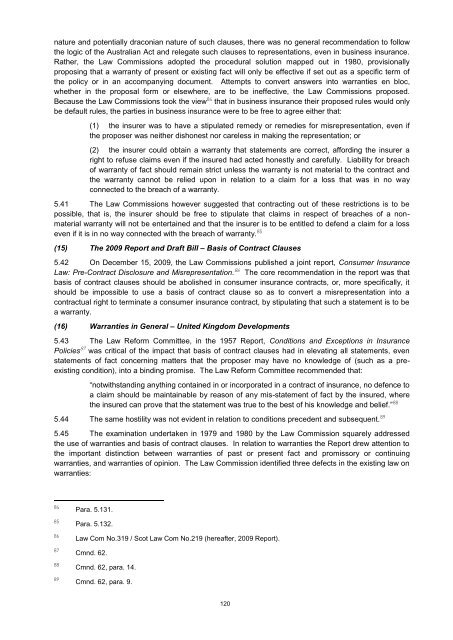Insurance Contracts CP - Law Reform Commission
Insurance Contracts CP - Law Reform Commission
Insurance Contracts CP - Law Reform Commission
Create successful ePaper yourself
Turn your PDF publications into a flip-book with our unique Google optimized e-Paper software.
nature and potentially draconian nature of such clauses, there was no general recommendation to follow<br />
the logic of the Australian Act and relegate such clauses to representations, even in business insurance.<br />
Rather, the <strong>Law</strong> <strong>Commission</strong>s adopted the procedural solution mapped out in 1980, provisionally<br />
proposing that a warranty of present or existing fact will only be effective if set out as a specific term of<br />
the policy or in an accompanying document. Attempts to convert answers into warranties en bloc,<br />
whether in the proposal form or elsewhere, are to be ineffective, the <strong>Law</strong> <strong>Commission</strong>s proposed.<br />
Because the <strong>Law</strong> <strong>Commission</strong>s took the view 84 that in business insurance their proposed rules would only<br />
be default rules, the parties in business insurance were to be free to agree either that:<br />
(1) the insurer was to have a stipulated remedy or remedies for misrepresentation, even if<br />
the proposer was neither dishonest nor careless in making the representation; or<br />
(2) the insurer could obtain a warranty that statements are correct, affording the insurer a<br />
right to refuse claims even if the insured had acted honestly and carefully. Liability for breach<br />
of warranty of fact should remain strict unless the warranty is not material to the contract and<br />
the warranty cannot be relied upon in relation to a claim for a loss that was in no way<br />
connected to the breach of a warranty.<br />
5.41 The <strong>Law</strong> <strong>Commission</strong>s however suggested that contracting out of these restrictions is to be<br />
possible, that is, the insurer should be free to stipulate that claims in respect of breaches of a nonmaterial<br />
warranty will not be entertained and that the insurer is to be entitled to defend a claim for a loss<br />
even if it is in no way connected with the breach of warranty. 85<br />
(15) The 2009 Report and Draft Bill – Basis of Contract Clauses<br />
5.42 On December 15, 2009, the <strong>Law</strong> <strong>Commission</strong>s published a joint report, Consumer <strong>Insurance</strong><br />
<strong>Law</strong>: Pre-Contract Disclosure and Misrepresentation. 86 The core recommendation in the report was that<br />
basis of contract clauses should be abolished in consumer insurance contracts, or, more specifically, it<br />
should be impossible to use a basis of contract clause so as to convert a misrepresentation into a<br />
contractual right to terminate a consumer insurance contract, by stipulating that such a statement is to be<br />
a warranty.<br />
(16) Warranties in General – United Kingdom Developments<br />
5.43 The <strong>Law</strong> <strong>Reform</strong> Committee, in the 1957 Report, Conditions and Exceptions in <strong>Insurance</strong><br />
Policies 87 was critical of the impact that basis of contract clauses had in elevating all statements, even<br />
statements of fact concerning matters that the proposer may have no knowledge of (such as a preexisting<br />
condition), into a binding promise. The <strong>Law</strong> <strong>Reform</strong> Committee recommended that:<br />
―notwithstanding anything contained in or incorporated in a contract of insurance, no defence to<br />
a claim should be maintainable by reason of any mis-statement of fact by the insured, where<br />
the insured can prove that the statement was true to the best of his knowledge and belief.‖ 88<br />
5.44 The same hostility was not evident in relation to conditions precedent and subsequent. 89<br />
5.45 The examination undertaken in 1979 and 1980 by the <strong>Law</strong> <strong>Commission</strong> squarely addressed<br />
the use of warranties and basis of contract clauses. In relation to warranties the Report drew attention to<br />
the important distinction between warranties of past or present fact and promissory or continuing<br />
warranties, and warranties of opinion. The <strong>Law</strong> <strong>Commission</strong> identified three defects in the existing law on<br />
warranties:<br />
84<br />
85<br />
86<br />
87<br />
88<br />
89<br />
Para. 5.131.<br />
Para. 5.132.<br />
<strong>Law</strong> Com No.319 / Scot <strong>Law</strong> Com No.219 (hereafter, 2009 Report).<br />
Cmnd. 62.<br />
Cmnd. 62, para. 14.<br />
Cmnd. 62, para. 9.<br />
120

















